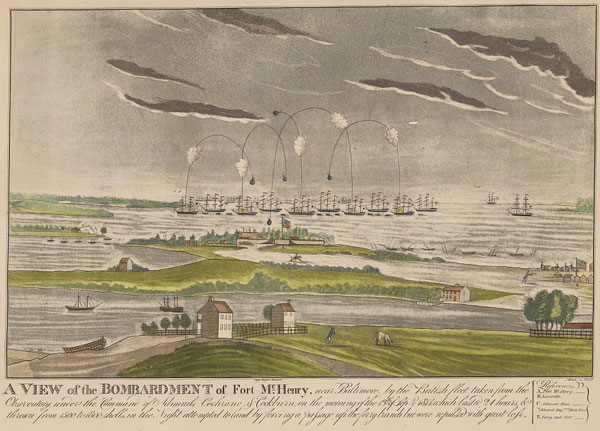Early in the war, the British commanded the seas along the Atlantic coast. In 1814, however, they found the Americans at Fort McHenry could withstand a terrible bombardment and still defend their flag.
"at early dawn his eye was again greeted by the proudly-waving flag of his country" Baltimore Register, September 1814

John Bower, Philadelphia, 1818, Library of Congress
In August 1814, British troops under General Robert Ross and Admiral Alexander Cochrane landed at Benedict, Maryland with the goal of marching on Washington and threatening the American capital. The campaign was a success for the British, and a deep humiliation for the Americans: after a short battle on August 24th, British troops entered the city, burned public buildings, and then withdrew to their ships.
Ross and Cochrane planned to follow their success at Washington by attacking Baltimore. A thriving port city, Baltimore was even more valuable than Washington. The British commanders sailed up the Chesapeake Bay toward Baltimore and arrived in mid-September. General Ross landed his men and marched them toward the city, while Admiral Cochrane anchored his ships just beyond the range of guns at Fort McHenry near the mouth of Baltimore’s harbor.
The British campaign had a promising start. Their land forces defeated American militia near Bear Creek, though Ross was killed in action. His troops rallied and continued their march, stopping just outside Baltimore city to await the supporting naval attack from their ships in the harbor.
On September 13, Cochrane began a heavy bombardment of Fort McHenry. His goal was to destroy the fortifications and enable the land attack.
American defenders would not budge so easily. An officer reported that the soldiers within the fort were “gallant individuals who partook with the danger of a tremendous bombardment, without the ability of retorting, and without that security, which, in more regular fortifications, is provided for such occasions.” Despite firing over 1,500 shells, the British ships were unable to destroy the fort. An observer named Francis Scott Key penned a few lines of poetry to commemorate the battle. Afterwards, locals put the words to music and the Star-Spangled Banner was born.
Without naval support, British commanders decided the loss necessary to capture Baltimore outwieghed the value of the town. Both land forces and Cochrane’s fleet withdrew, leaving Baltimore untouched. The British failure to capture Baltimore left them without a good harbor for a base of naval operations, and as the American navy grew more experienced, British supremacy on the seas began to decline.
Last updated: May 24, 2016
